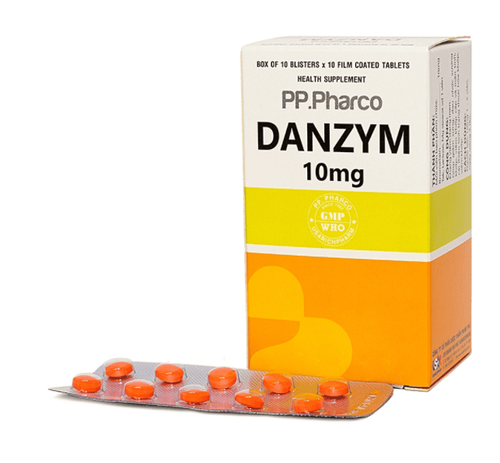This is an automatically translated article.
Zyloprin is a drug that works to reduce uric acid in the blood by reducing its production. The drug is used in some cases of increased uric acid due to metabolic disorders, cancer drugs or some other causes.
1. What is Zyloprim?
Zyloprim has the main ingredient Allopurinol, which is made in tablet form. Allopurinol is an isomer of hypoxanthine, which reduces uric acid in the blood.
Uric acid is a metabolic product of purines. The purines are converted to hypoxanthine and xanthin and then oxidized by xanthine oxidase to uric acid. Allopurinol is a strong inhibitor of xanthine oxidase, so it helps to reduce uric acid biosynthesis, reduce the concentration of uric acid in the blood and urine, and increase the concentration in the blood and urine of uric acid precursors such as uric acid. hypoxanthine and xanthin are more soluble. Thus, allopurinol also prevents the formation of uric acid stones in the kidneys.
2. What diseases does Zyloprim treat?
Zyloprim is indicated for use in the following cases:
Chronic gout, urate stones in the kidney. Hyperuricemia secondary to cancer treatments, anti-cancer drugs, thiazide diuretics... Increased uric acid in the blood that cannot be used with probenecid or sulfinpyrazone due to drug-resistant or allergic reaction. Zyloprim should not be used in the following cases:
Hypersensitivity to the active ingredient allopurinol or any ingredient in the formulation. Idiopathic hemochromatosis; or have a family history of the condition. Allopurinol should not be used for the initial treatment of an acute gout attack. The drug is contraindicated in children, except in cases of tumor disease or enzyme disorders, tumor lysis syndrome or Lesch-Nyhan syndrome Do not use in pregnant women Use this medicine with caution in pregnant women. breastfeeding women.
3. Dosage and how to use Zyloprim
3.1. Dosage The drug is indicated for oral administration. You can use this medicine after a meal to help avoid stomach upset. When taking this medicine, you should drink it with plenty of water to help prevent kidney stones.
3.2. Dosage Dosage of the drug depends on the individual case. Below are the dosages that you can refer to.
For gout:
Adults: Initial dose, 100 to 300 milligrams (mg) per day, taken once a day or you also divided into several times. Your doctor may also adjust your dose as needed to keep uric acid levels under control. However, the dose is usually no more than 800 mg per day. Children: Use for this is not indicated. For high uric acid levels caused by cancer drugs:
Adults and children 11 years of age and older: Take 600 to 800 milligrams (mg) per day, divided into 2 divided doses. up to 3 days. Children 6 to 10 years: 300 mg orally once a day for 2 to 3 days. Children under 6 years: Take 150 mg orally once a day for 2 to 3 days. For kidney stones:
Adults: Take 200 to 300 milligrams (mg) per day, once a day or also in divided doses. Your doctor may adjust the dose up or down as needed. However, the daily dose is usually not more than 800 mg per day. Children: Not indicated in this case.
4. What are the side effects of Zyloprim?
Like other drugs, when using Zyloprim, there can also be unwanted effects. Tell your doctor right away if any of the following side effects occur:
Common Effects:
Ankle pain, pain in the knee or big toe joint; joint stiffness or swelling. Rash; rash with flat lesions or the appearance of small raised lesions on the skin. Rare side effects:
Agitation; breath that smells like ammonia; Feelings of fear; confused; depression; irritability. Bleeding gums; blood in the urine or stools; nosebleed; bloody or black, tarry stools; blue or pale skin; bruising on the skin; Blistering, peeling, or peeling of the skin; color change on the skin; chest pain or discomfort; chest pain, which may move to the left arm, neck, or shoulder; Chills; clay color stools; dark urine Decreased awareness or reaction; decreased urine output; flushing or redness of the skin, especially on the face and neck; Headache ; uncomfortable feeling; rash, itching; Hoarseness of voice; incoherent speech; anorexia.
5. Precautions when using Zyloprim
Before taking this medicine you need to tell your doctor about any history of allergies to the drug, other medical problems that may affect its use, especially:
Bone marrow problems or liver disease: Use with caution as this may worsen liver damage. Cancer; multiple myeloma; Congestive heart disease; Diabetes or high blood pressure; Hyperuricemia; Kidney problems, chronic such as glomerulonephritis, pyelonephritis need to be used with caution. May reduce drug elimination and cause more severe side effects. When you start using this medicine, due to a decrease in uric acid levels in the blood, it activates urate crystals in the joints making you more likely to have more gout attacks. Continue using this medicine even if an acute gout attack occurs. Your doctor may prescribe you other medicines such as colchicine, a nonsteroidal anti-inflammatory drug (NSAID) to help prevent gout attacks.
It is necessary to increase water intake during treatment with this medicine and also need to increase the intake of more fiber when taking this medicine. Reduce your intake of animal protein, sodium, refined sugar or foods rich in oxalates and calcium, especially if you have recurrent kidney stones.
You may need to monitor drug response regularly through routine testing.
Zyloprim may increase the concentration of theophylline drugs, warfarin when taken together, by prolonging the half-life of these drugs. The drug may also potentiate the aciduria effect of probenecid, reducing the elimination of drugs that are acidic in nature.
Zyloprim is used under a doctor's prescription, in case of any abnormality in taking the drug, it is necessary to notify the doctor immediately for advice.
Please dial HOTLINE for more information or register for an appointment HERE. Download MyVinmec app to make appointments faster and to manage your bookings easily.













